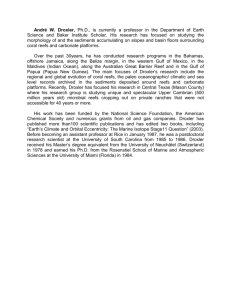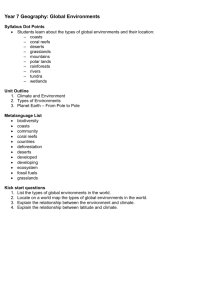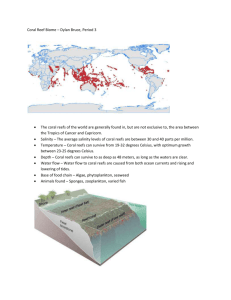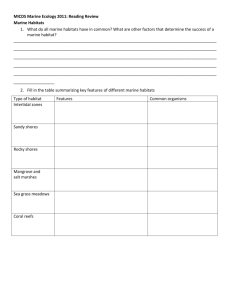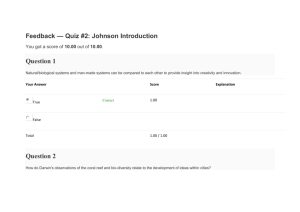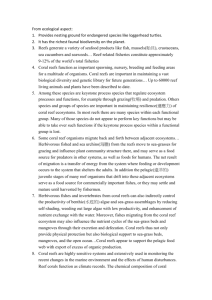What`s Hiding in the Coral Reefs?
advertisement
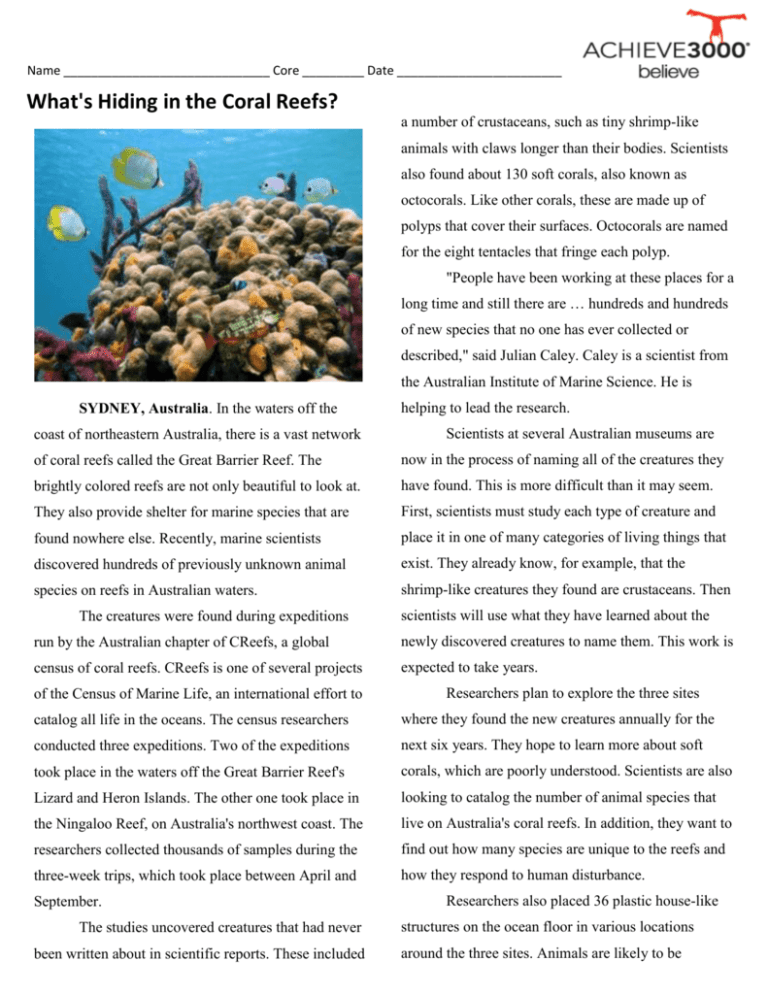
Name ______________________________ Core _________ Date ________________________ What's Hiding in the Coral Reefs? a number of crustaceans, such as tiny shrimp-like animals with claws longer than their bodies. Scientists also found about 130 soft corals, also known as octocorals. Like other corals, these are made up of polyps that cover their surfaces. Octocorals are named for the eight tentacles that fringe each polyp. "People have been working at these places for a long time and still there are … hundreds and hundreds of new species that no one has ever collected or described," said Julian Caley. Caley is a scientist from the Australian Institute of Marine Science. He is SYDNEY, Australia. In the waters off the coast of northeastern Australia, there is a vast network helping to lead the research. Scientists at several Australian museums are of coral reefs called the Great Barrier Reef. The now in the process of naming all of the creatures they brightly colored reefs are not only beautiful to look at. have found. This is more difficult than it may seem. They also provide shelter for marine species that are First, scientists must study each type of creature and found nowhere else. Recently, marine scientists place it in one of many categories of living things that discovered hundreds of previously unknown animal exist. They already know, for example, that the species on reefs in Australian waters. shrimp-like creatures they found are crustaceans. Then The creatures were found during expeditions scientists will use what they have learned about the run by the Australian chapter of CReefs, a global newly discovered creatures to name them. This work is census of coral reefs. CReefs is one of several projects expected to take years. of the Census of Marine Life, an international effort to Researchers plan to explore the three sites catalog all life in the oceans. The census researchers where they found the new creatures annually for the conducted three expeditions. Two of the expeditions next six years. They hope to learn more about soft took place in the waters off the Great Barrier Reef's corals, which are poorly understood. Scientists are also Lizard and Heron Islands. The other one took place in looking to catalog the number of animal species that the Ningaloo Reef, on Australia's northwest coast. The live on Australia's coral reefs. In addition, they want to researchers collected thousands of samples during the find out how many species are unique to the reefs and three-week trips, which took place between April and how they respond to human disturbance. September. The studies uncovered creatures that had never been written about in scientific reports. These included Researchers also placed 36 plastic house-like structures on the ocean floor in various locations around the three sites. Animals are likely to be attracted to the structures and make them their homes. marine life; it could also have direct benefits for Researchers will go back and study the life inside each humans because some marine life is used in medicines. house over the next few years. The project marks the first time any group has "Some people say, 'Going out and collecting samples—of what value is that?'" said Ron Johnstone, made a concentrated effort to understand the a marine science professor who has looked at the biodiversity of the Great Barrier Reef. It's important research. In response, Johnstone compared the planet work. Coral reefs protect as many as one-quarter of the to a machine. The more familiar scientists are with the planet's marine species, but reefs are under threat. parts of the machine, he said, the better they can help They are harmed by certain fishing practices, as well fix its problems. "It's a bit like saying … [without as over-fishing and pollution. The scientists' findings research], we don't know what bits of the machine fit could show them how better to protect the reefs. together to make it work." Helping the reefs would not only be beneficial to Dictionary beneficial (adjective) biodiversity (noun) census (noun) helpful the range of living things in an environment official count of a population crustacean (noun) a type of aquatic animal with a segmented body and paired, jointed limbs, including lobsters, crabs, and shrimp polyp (noun) a type of animal form that has a fixed base, a column-shaped body, and a free end with a mouth and tentacles Multiple Choice: Circle the letter of the choice the best completes the statement. (2 points each) 1. What is this article mainly about? A. Coral reefs protect many of the planet's marine species, but reefs can be harmed by pollution. B. Researchers have placed house-like structures on the ocean floor at research sites. C. Scientists hope to learn more about soft corals, which are a major part of the Great Barrier Reef. D. Scientists have discovered some previously unknown animal species on reefs in Australian waters. 4. Suppose that Jamal wants to find out more about the Great Barrier Reef. He would find most of his information __________. A. Between Australia and India on a map of the world B. In the glossary of a book about scuba diving in tropical waters C. In a reference book about the seas around Australia D. Under the term "pollution" on a Web site about the world's oceans 5. The article states: The census researchers conducted 2. According to the article, why were marine scientists three expeditions. Two of the expeditions took place in exploring the coral reefs in Australia? the waters off the Great Barrier Reef's Lizard and A. Their study was necessary in order to determine the beauty of the coral reefs. B. Their study was part of an international effort to catalog all life in the oceans. C. Their study was part of an effort to identify three Heron Islands. The other one took place in the Ningaloo Reef, on Australia's northwest coast. Which would be the closest synonym for the word conduct? A. Donate B. Isolate sites that would be best for tourists who want to C. Direct look at coral. Their study was needed to measure D. Ambush the effect of fishing laws on the Great Barrier Reef. 3. Which is the closest synonym for the word beneficial? A. Favorable B. Unique C. Sullen D. Interior 6. The author probably wrote this article in order to __________. A. Inform readers about what coral reefs around the world look like B. Inform readers about the discovery of unknown species on Australian reefs C. Explain the differences between various species of crustaceans 8. The news article says all of the following except __________. D. Explain the reasons why the coral reefs are in danger from pollution 7. Which of these is most important to include in a summary of this article? A. Two of the expeditions took place in the waters off the Great Barrier Reef's Lizard and Heron Islands. B. Researchers collected thousands of samples during the three-week trips, which took place between A. The scientific studies could have direct benefits for the treating of human illnesses. B. Scientists are now in the process of naming the newly found sea creatures. C. The studies uncovered creatures that had never been written about in scientific reports. D. Scientists will explore the places where they found April and September. C. Scientists know that the shrimp-like creatures they found are crustaceans that had been previously discovered during an earlier marine expedition. D. Scientists are now in the process of naming all of the creatures found during the three expeditions to Australia's coral reef new creatures annually for the next six years. Opinion Question: Now that you have read the article, indicate in the space below what you think the best reason is to study Australia's coral reefs? (5 points) Thought Question: What have scientists learned about Australia's coral reefs? Why is it important to study the reefs? Refer to the article for ideas. You can use your own ideas, too. (5 points) Math- The Great Barrier Reef has over 1,000 miles of coral reefs. One mile is the same as 1.61 kilometers. How many kilometers are equivalent to 1,000 miles? (2 points)

